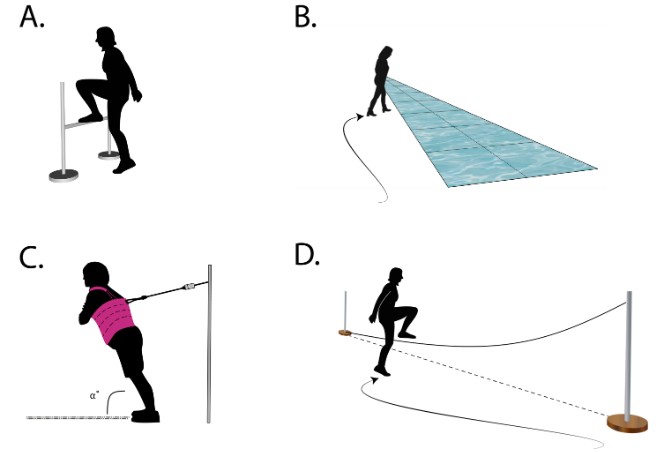As we grow older our cognitive and physical abilities decline, but do we adjust our behaviour accordingly? If one’s perception of their declined physical ability is not adjusted to the new situation, unsafe behaviour could occur. A disparity between one’s perceived and actual ability, also known as misjudgment, may lead to risk-taking or inefficiency. As a consequence, this disparity might explain why some older adults fall while their peers with similar cognitive and physical ability do not. Fall prediction algorithms might benefit from a misjudgment term if it is a trait variable that is consistent between tasks. On the contrary, a lack of consistency between tasks would indicate that the degree of misjudgment on one task cannot be predicted by evaluation of prior tasks and suggests that a misjudgment term may have limited benefit for fall prediction. To this end, we investigated whether the degree of misjudgment of stepping ability is consistent between several stepping tasks in young and older adults.
We introduced four tasks (see figure) in which the participant’s perceived ability and actual stepping ability were determined. The tasks consisted of: A) stepping over a raised bar, B) stepping over a twelve-meter-long converging piece of paper at a self-selected width, while starting at the broad end of 2-meter width, C) making a recovery step after release from an inclined position, and D) crossing a declining cord at a self-selected height, while starting at the highest end of 1.2 meter. For each task, a linear model was used to determine the relationship between the perceived and actual ability, where the distance between the perceived ability and the corresponding predicted actual ability served as the degree to which a participant misjudged their physical ability. Moreover, the validity of the tasks were examined using the following criteria: “1) the perceived and actual physical ability measure of one task should relate highly to the same measures of another task, 2) the relation between perceived and actual physical ability should be linear,” 3) the linear regression model should be parallel to the identity line.

Figure. A) stepping over a raised bar, B) stepping over a converging piece of paper at a self-selected width, C) making a recovery step after release from an inclined position, D) crossing a declining cord at a self-selected height.
We showed that the actual ability measures and perceived ability measures were consistent across tasks. However, the degree of misjudgment was not consistent between different stepping tasks, but rather task-specific and could not be generalised to other stepping tasks. Furthermore, only one of the tasks satisfied our validity criteria of, which hampers comparison of the degree of misjudgment over tasks. Future research should implement novel and valid tasks to investigate the added value of a misjudgment term in fall prediction models.
Publication
Kluft N, Bruijn SM, Weijer RHA, van Dieën JH, Pijnappels M (2017). On the validity and consistency of misjudgment of stepping ability in young and older adults. PLOS ONE 12(12): e0190088. https://doi.org/10.1371/journal.pone.0190088
About the Author

Nick Kluft
Department of Human Movement Sciences, Vrije Universiteit Amsterdam
Nick Kluft is a PhD candidate at the Department of Human Movement Sciences at the Vrije Universiteit Amsterdam in The Netherlands. His research focuses on the discrepancy between perceived and actual physical ability, and how this misjudgment affects gait, stepping behaviour and responses to gait perturbations in older adults. This research was supported by the Dutch Organisation for Scientific Research (NWO 91714344).
Copyright
© 2018 by the author. Except as otherwise noted, the ISPGR blog, including its text and figures, is licensed under a Creative Commons Attribution-ShareAlike 4.0 International License. To view a copy of this license, visit https://creativecommons.org/licenses/by-sa/4.0/legalcode.
ISPGR blog (ISSN 2561-4703)
Are you interested in writing a blog post for the ISPGR website? If so, please email the ISGPR Secretariat with the following information:
- First and Last Name
- Institution/Affiliation
- Paper you will be referencing
